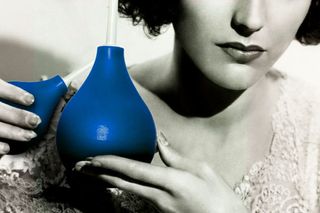
The Vagina Is Perfectly Capable of Cleansing Itself, No Douching Required
Douching interferes with the vagina’s ‘good’ bacteria and its natural acidity, which actually increases the risk of infection.

Many people think that douching will prevent pregnancy, or curb a bacterial infection from spreading. Some douche because they think it is hygienic or because they think their vagina has a bad odor.
Unfortunately, douching doesn’t help with any of the above. In fact, douching is bad for the vagina.
In French, ‘douche’ means to soak or rinse. The practice of douching is defined as washing or rinsing the vagina with water and other pre-prepared mixtures that may contain water, baking soda, vinegar or iodine and that are easily available over-the-counter at chemists and other shops. These mixtures supposedly cleanse the inside of the vagina — or so the marketers falsely advertise.
Douching is different from washing the outside of your vagina during a shower, say, with warm water. This practice isn’t harmful — but douching is.
Here is what douching actually does to the vagina.
Is douching good or bad?
It’s bad. According to the U.S. Department of Health and Human Services, “most doctors recommend that women do not douche.”
A healthy vagina contains good bacteria, a collection known as flora. The right balance and composition of these bacterial strains help to maintain a vagina’s acidic environment, which protects the vagina against infections and irritations.
Douching changes this necessary balance, interfering with the vaginal flora, and thus the vaginal canal’s natural acidity. This, in turn, may actually cause an overgrowth in some bacteria species, causing problems such as a yeast infection, bacterial vaginosis or inflammation of the vagina.
Can douching help with an already existing vaginal infection?
No. Per the U.S. Department of Health and Human Services’ website, douching, if you already have an infection, will push the infection further up into the uterus, Fallopian tubes or the ovaries, where it will ultimately become pelvic inflammatory disease (PID) – an infection of the female reproductory organs. PID is known to cause trouble getting pregnant and chronic pelvic pain.
Related on The Swaddle:
Can douching prevent transmission of sexually transmitted diseases?
No. In fact, douching may make the vagina more susceptible to sexually transmitted infections (STIs) because it alters the vaginal flora by removing the normal, good bacteria that protect the vagina from infection.
What other health problems can douching cause?
Besides contributing to bacterial vaginosis and PID, and making the vagina more vulnerable to STIs, douching can cause general vaginal dryness and irritation.
A habit of douching may also cause problems related to fertility and pregnancy. Although it isn’t established to what extent or how douching interferes with each, per a 1996 study, women who douched while trying to conceive were 30% less likely to become pregnant each month they attempted. Douching, at any point in life, has been linked to a higher risk of ectopic pregnancies. And douching during pregnancy has been linked by a small-scale study to a higher likelihood of preterm birth. The explanation behind each of these is douching increases the chances of contracting a reproductive tract infection, and the RTI developing into PID — which is a known risk factor for reduced fertility and pregnancy complications.
Other research has linked douching to increased risk of sexually transmitted infection, as douching leaves the vaginal tract more susceptible to harmful bacteria and viruses. This could explain why douching has been linked to increased risk of cervical cancer — most cases of which are caused by the sexually transmitted infection HPV.
Related on The Swaddle:
Untrending: There Is No Scientific Evidence Steaming Your Vagina Cleanses It
Does douching cleanse the vagina?
Again, no. Vaginas are not supposed to be discharge-free, or odorless. A vagina is perfectly capable of cleansing itself, with the help of natural secretions like mucus, which washes away blood, semen, and vaginal discharge.
That’s not to say vaginal discharge is dirty — vaginal discharge is an important indicator ofgood vaginal health. It provides a protective environment and natural lubrication; it may have a distinct smell that varies from women to women but that is healthy, too. Some may have a stronger smell due to the presence of more sweat glands in the pubic area, while some others will have a relatively faint smell. Either way, douching to ‘cleanse’ the vagina is not recommended.
If I want to feel clean ‘down there,’ what can I do?
As mentioned earlier, it is best to let your vagina clean itself. What you can do is clean the outside with warm water while bathing. “Avoid using scented tampons, pads, powders and sprays. These products may increase your chances of getting a vaginal infection,” according to the U.S. Health Department.
Anubhuti Matta is an associate editor with The Swaddle. When not at work, she's busy pursuing kathak, reading books on and by women in the Middle East or making dresses out of Indian prints.
Related


Mindful Meditation Holds Potential as Mental Health Intervention but Lacks Enough Scientific Evidence to Prove Its Effectiveness
